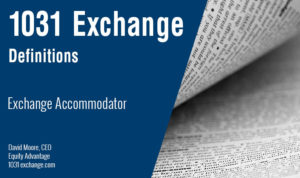
Delaware Statutory Trusts: An Innovative 1031 Exchange Solution
Real estate investors will not spend a lifetime avoiding capital gains tax via 1031 exchange to simply throw in the towel at the end. Logically, they will seek out an ownership format that better compliments their new, more relaxed life style.
Historically DSTs were looked at as an end game but with the increasingly difficult landscape for rental owners due to rent control, COVID-19 and new rules allowing tenants to not pay rent. Investors will find something very similar to what they already own, albeit remotely managed and truly passive. Something that allows them to completely disengage from the day to day decision making process. They may find the DST can be a very suitable option.
What Is a DST?
A DST (Delaware Statutory Trust) is simply a separate legal entity created under the laws of Delaware to hold title to one or more income producing commercial properties. A DST offering can be any type of commercial property; apartments, retail space, office buildings, industrial parks, etc.
Much like a REIT (Real Estate Investment Trust), an individual DST may hold title to multiple properties at one time. If the DST contains multiple assets please note it may be necessary to file a tax return in each State the DST has properties.
Each investor owns a “beneficial interest” in the trust which, in turn owns the underlying Real Property. This DST interest entitles the investor to his or her pro-rata share of income and appreciation in the DST’s assets.
Why Invest in a DST?
Inventory: Inventory is always available for 1031 Identification.
Low minimum investment: DSTs typically have a minimum investment of $100,000 for 1031 exchangers and $25,000 for cash investors.
Remote management: The DST structure takes management responsibility for the property(s) out of the hands of investors and places it into the hands of a sponsor-affiliated trustee.
Cash distribution potential: The rental income generated from the DST properties is distributed on a monthly basis directly to your bank account.
Diversification: Instead of having all your money tied up in one property, DSTs allow you to diversify both geographically and functionally.
Low cost of ownership: Unlike a tenant- in-common (TIC) program, DST investors are not required to maintain any type of special purpose LLC to hold their real estate.
Non-recourse loans: DST investors are not required to execute any loan guarantees or indemnities, given their purely passive relationship to the DST and its real estate.
Liability protection: The DST “wrapper” shields the exchanger/investor from any liabilities with respect to the property.
The Sponsors
Even though DST properties, as a 1031 exchange option, are approximately 20 years old, in 2016 DST properties comprised approximately 10% of all replacement properties in 1031 Exchange nationally.
When DST started nearly 18 years ago, there were 3 companies present at the creation: Inland, Passco and Triple Net. The first two are still with us the third went away in a reverse merger with Grubb Ellis Company. By the peak of the housing market bubble in 2008, product demand so greatly exceeded supply, the number of sponsors skyrocketed to over 100.
When the dust settled and 1031 exchanges ramped back up in 2009 – 2010, nearly 80% of the DST market consolidated around two property sponsors: Inland and Passco. These two companies are ‘heritage’ players. By ‘heritage’ I mean they were there at the beginning and will likely be there at the end
At their best, DST property sponsors should not be opportunistic. They should not be jumping in and out of the space when convenient or profitable. They too should be in it for the long term. There are currently 30 property providers active in the DST space. All but three of these; Inland, Passco and AEI are post 2008 inventions.
Above we have David Moore of Equity Advantage and our DST Expert, Robert Smith of Peregrine Private Capital as they cover DST Investments and the options they provide you today. For more info check out our YouTube segments on DSTs!
Learn More about DSTs on YouTube
MORE INFORMATION
The Equity Advantage Incorporated Channels
Head to our channel and watch as owner of Equity Advantage David Moore speaks on 1031 Exchanges and other issues concerning commercial real estate in today’s unique market.
1031 vs. 121: What Are Your Options?
Self-Directed IRA’s and Disqualified Parties
Visit our Video Library for more videos!
Tom’s Tip of the Month
When investing with a 1031 exchange, when can you receive the funds from the transaction? Tom Moore, 1031 exchange expert, explains.
The Guys With All The Answers…
 David and Thomas Moore, the co-founders of Equity Advantage & IRA Advantage
David and Thomas Moore, the co-founders of Equity Advantage & IRA Advantage
Whether working through a 1031 Exchange with Equity Advantage, acquiring real estate with an IRA through IRA Advantage or listing investment property through our Post 1031 property listing site we are here to help Investors get where they want to be. About Us…










